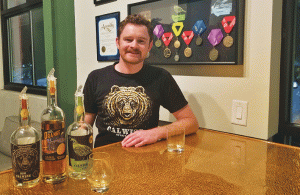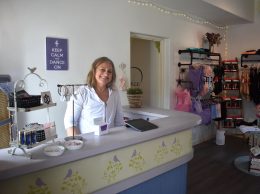Opinion: State must find a way to protect both our health and our small businesses
By Aaron Bergh
On Dec. 5, I woke up to the news that almost the entire state of California was once again shutting down a significant portion of the alcohol industry—indefinitely.
I found it painfully ironic that this announcement came on Repeal Day—the 87th anniversary of the ratification of the 21st Amendment, which officially repealed Prohibition. On a day that should have been a celebration of the defeat of a nonsensical law, all bars, distilleries, breweries, wineries and even restaurants serving food were told to cease indoor and outdoor service.

I own Calwise Spirits Co., a restaurant, bar and distillery in Paso Robles. As with thousands of other businesses in California, this is the fourth time this year that I am being required to close my food and drink service. I am concerned with what the new indefinite closure could mean for my business and others in my community.
I applaud Assemblyman Jordan Cunningham, who noted that Gov. Gavin Newsom’s new regional “stay home” order makes San Luis Obispo County’s level of openness unfairly dependent on the capacity of the Los Angeles region’s hospitals, hundreds of miles away.
Cunningham called the state’s regional groupings “arbitrary and irrational,” and stated, “The administration must alter this nonsensical regional map to better take into account our area’s unique situation and hospital bed capacity.” I also applaud our local supervisors for their efforts to remove our Central Coast counties from the Southern California region.
The idea of our local hospitals becoming overwhelmed terrifies me, and I believe we should prevent this from happening. Fortunately, our area has done a good job at mitigating the virus. This includes our local establishment owners who have worked hard to ensure that their guests and employees remain safe, and who have invested heavily in the means necessary to support expanded outdoor service.
According to San Luis Obispo County’s most recent data, only a small fraction of local hospital beds are currently in use by COVID-affected patients. As reported by San Luis Obispo County Health Officer Penny Borenstein during our Board of Supervisors meeting on Dec. 8, the combined intensive care unit capacity of San Luis Obispo, Santa Barbara, and Ventura counties is around 35%—well above Newsom’s new 15% shutdown threshold.
If outside service at local bars, restaurants and tasting rooms is causing a significant threat to public health in San Luis Obispo County, then where is the data to support that assertion? Why are our hospital numbers low in the county despite our area being open for outdoor service at hundreds of establishments up until last week, and for indoor service as recently as a month ago?
A story this week in the Los Angeles Times spoke to how ill-conceived, one-size-fits-all policies like this are only making matters worse. In this story, Brown University health economist Emily Oster told the Times, “Some of these things they’re telling you not to do are incredibly low-risk. When you are so strict about what people can do, they stop listening.”
An infectious disease specialist at UC San Francisco added, “(People) are losing trust in public health officials who put out arbitrary restrictions. We are failing in our public health messaging.”
This latest shutdown not only erodes the viability of local business owners, it affects the economic, medical and educational welfare of our employees and their households. A new Gallup poll found that mental health in America is in precipitous decline. I think that we can be deeply concerned about COVID-19 while still questioning our decision makers, because knee-jerk policies have the potential to do serious long-term damage.
This isn’t about business owners favoring personal greed over the lives of others. It’s about applying rational, realistic and balanced risk management. Proprietors are just trying to keep food on the table for their families and keep their people employed so they can feed their families. Personally, my business will be selling bottles of spirits and holiday cocktail kits to-go and online. Many other businesses will also be getting creative with their offerings.
Small businesses are integral to creating innovation, culture, and jobs in our community. It is now more important than ever to go out and support them and the diversity they create. This holiday season—and beyond—shop local!
• Aaron Bergh is president and distiller at Calwise Spirits Co. in Paso Robles.










